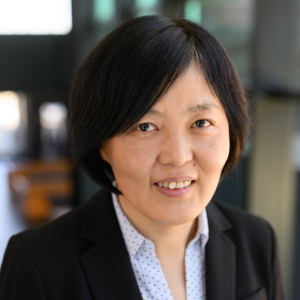
Tianyan Gao, PhD
Connect
859-323-3454tianyan.gao@uky.edu
Positions
- Professor
- William A. Marquard Chair in Cancer Research
College Unit(s)
Other Affiliation(s)
- Markey Cancer Center
Biography and Education
Education
B.S. Beijing Medical University, Beijing, China
Ph.D. Northwestern University, Chicago, IL
Postdoctoral fellow, University of California San Diego, La Jolla, CA
Research
Protein phosphorylation defines one of the most important and pervasive regulatory mechanisms in cell signaling. A precise control of the balance between phosphorylation and dephosphorylation is crucial for living organisms to maintain normal physiological functions. While protein kinases have been extensively studied in efforts of developing therapeutically relevant inhibitors, significant knowledge gaps exist on the opposing actions of protein phosphatases.
My laboratory has a long-standing interest in studying protein phosphatases and their relevance to cancer. Our research has been focused on determining the physiological role of a novel family of protein phosphatases, PHLPP, in regulating intestinal epithelial cell proliferation and apoptosis under normal and disease conditions. We were the first to show that PHLPP is frequently downregulated in colorectal cancer patients and that reintroduction of PHLPP into colon cancer cells inhibits cell proliferation in vitro and tumorigenesis in vivo. In addition, we identified PHLPP as a negative regulator of the RAS/RAF pathway that directly dephosphorylates RAF1 and inhibiting its kinase activity. Using knockout mouse models of PHLPP, we showed that PHLPP-loss promotes Apc-driven tumorigenesis in vivo by inhibiting apoptosis of intestinal epithelial cells. In addition, our studies have established PHLPP as an important regulator of glucose metabolism and ER stress in cancer cells. Recently, we have expanded our studies into other protein phosphatases. Our current work focuses on determining the mechanisms by which PTPRF, a receptor tyrosine phosphatase, regulates Wnt signaling.
Another area of research in my lab is to investigate mitochondria-dependent regulation of glucose and lipid metabolism in colon cancer. Using organoid models derived from normal and tumor tissues, we investigated the functional importance of mitochondria-dependent metabolism in regulating cancer cell signaling to maintain stem cell population in colon cancer. Furthermore, we are interested in studying how the metabolic interaction between adipocytes and cancer cells promotes cancer cell survival and stem cell functions.
Selected Publications
-
Liu J, Weiss HL, Rychahou PG, Jackson LN, Evers BM, and Gao T (2009) Loss of PHLPP expression in colon cancer: Role in proliferation and tumorigenesis. Oncogene 28:994-1004
-
Li X, Stevens PD, Yang H, Gulhati P, Wang W, Evers BM, Gao T (2013) The deubiquitination enzyme USP46 functions as a tumor suppressor by controlling PHLPP-dependent attenuation of Akt signaling in colon cancer. Oncogene 32: 471-478.
-
Wen YA, Stevens PD, Gasser ML, Andrei R, Gao T (2013) Downregulation of PHLPP expression contributes to hypoxia-induced resistance to chemotherapy in colon cancer cells. Mol Cell Biol. 33(22): 4594-605.
-
Li X, Stevens PD, Liu J, Yang H, Wang W, Wang C, Zeng Z, Schmidt MD, Yang M, Lee EY, Gao T (2014) PHLPP is a Negative Regulator of RAF1 that Reduces Colorectal Cancer Cell Motility and Prevents Tumor Progression in Mice. Gastroenterology. 146(5):1301-1312.e10.
-
Wen Y-A, Xiong X, Harris JW, Zaytseva YY, Mitov MI, Napier DL, Weiss HL, Evers BM and Gao T. (2017) Adipocytes activate mitochondrial fatty acid oxidation and autophagy to promote tumor growth in colon cancer. Cell Death Dis. 8(2):e2593.
-
Stevens PD, Wen YA, Xiong X, Zaytseva YY, Li AT, Wang C, Stevens AT, Farmer TN, Gan T, Weiss HL, Inagaki M, Marchetto S, Borg JP, Gao T. (2018) Erbin suppresses KSR1-mediated RAS/RAF signaling and tumorigenesis in colorectal cancer. Cancer Res 78(17):4839-4852.
-
Wen YA, Xiong X, Scott T, Li AT, Wang C, Weiss HL, Tan L, Bradford E, Fan TWM, Chandel NS, Barrett TA, Gao T. (2019) The mitochondrial retrograde signaling regulates Wnt signaling to promote tumorigenesis in colon cancer. Cell Death Differ. Oct;26(10):1955-1969.
-
Gan T, Stevens AT, Xiong X, Wen YA, Farmer TN, Li AT, Stevens PD, Golshani S, Weiss HL, Mark Evers B, Gao T. (2020) Inhibition of protein tyrosine phosphatase receptor type F suppresses Wnt signaling in colorectal cancer. Oncogene. 39(44):6789-6801.
-
Guo B, Xiong X, Hasani S, Wen YA, Li AT, Martinez R, Skaggs AT, Gao T. (2021) Downregulation of PHLPP induced by endoplasmic reticulum stress promotes eIF2α phosphorylation and chemoresistance in colon cancer. Cell Death Dis. 12(11):960.
-
Xiong X, Hasani S, Young LEA, Rivas DR, Skaggs AT, Martinez R, Wang C, Weiss HL, Gentry MS, Sun RC, Gao T. (2022) Activation of Drp1 promotes fatty acids-induced metabolic reprograming to potentiate Wnt signaling in colon cancer. Cell Death Differ. 29(10):1913-1927.